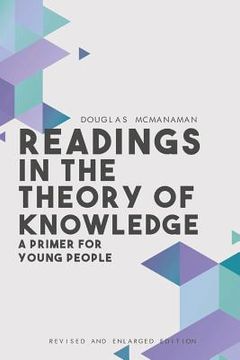Readings in the Theory of Knowledge: A Primer for Young People (Revised and Enlarged) (in English)
Synopsis "Readings in the Theory of Knowledge: A Primer for Young People (Revised and Enlarged) (in English)"
This book began as a series of short essays specifically written for my Theory of Knowledge students in the International Baccalaureate program at Father Michael McGivney Catholic Academy. Since publishing the first edition, I have continued to write short essays for them, primarily to make matters somewhat easier for them-the prescribed titles from which they choose a title for their TOK essay are still very lofty, perhaps a bit too lofty for high school students. I have used these new articles in class over the years and knew that I would include them in a second edition if I ever got around to writing one. This work is a revised and expanded version of the previous work. The font has been increased to 12, thanks to the complaints of some of my students, and I have added new chapters. One of my principal goals in publishing the first edition was to have students come to a genuine appreciation of the scope of uncertainty in the pursuit of knowledge, especially with respect to their day to day inferences. That remains my goal, because things have not changed all that much in this regard. In fact, dogmatism has intensified. Knowledge is very difficult to acquire, and good thinking is about bringing maximal and consistent plausibility to our own epistemic framework (the set of data through which we interpret the world around us). As new data (or theses) are added to our existing set of data, the plausibility of much of that information changes and, if we are honest thinkers, we try to re-establish coherence and maximal consistency to that new data set. That will involve discarding theses or data that are inconsistent with new data that has greater plausibility. This epistemic process is an ongoing one, which is why some of us-those who make the effort to think-change our minds very often throughout our lives. Science is a matter of plausible reasoning, which is why the history of science is evolutionary and revolutionary (the history of science is, among other things, a veritable graveyard of discarded hypotheses). So too is philosophy an evolutionary process-although the history of philosophy has had a very different kind of trajectory. All knowledge is subject to the same evolutionary law. One important lesson to take away from this fact is the importance of avoiding the habit of "over-stating your case". We do not always know for certain whether our data is correct (most often, the plausibility index of the data on which we ground our conclusions is less than certain), nor do we ever know whether we have enough information and whether the plausibility of our current conclusions will change as a result of additional information in the future, etc. Hence, the importance of cultivating a certain degree of epistemic humility. But the spirit of dogmatism-that stubborn unwillingness to examine new data for fear of upsetting the applecart of one's own conceptual framework-is alive and well in the world, especially among those who see themselves as open-minded progressives. This is ironic, because we seem to pride ourselves on being an open society. We are very far, however, from being the open society we imagine ourselves to be. We are not critical thinkers until we begin to question the plausibility of our sources, reject outright the epistemic hubris that characterizes so many talking heads and political pundits in mainstream media, and learn to suspend our disbelief. This book aims to help further that end among young people.

